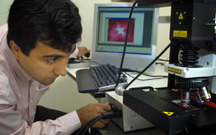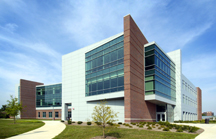
| RELATED INFO |
| * Bios |
| * Info for faculty |
| * Discovery Park |
| * Purdue Research Foundation |
| * Purdue Weldon School of Biomedical Engineering |
| * Alfred Mann Foundation |

March 16, 2007
Mann Foundation for Biomedical Engineering endows Purdue with $100 million Alfred Mann Institute for Biomedical Development
WEST LAFAYETTE, Ind. - |
The university-based institute is designed to enable the commercialization of innovative biomedical technologies that improve human health. The announcement was made during a joint news conference on Friday (March 16) at Purdue's Biomedical Engineering Building in Discovery Park.
The $100 million endowment is the largest single endowment ever created for Purdue.
 |
"Through Purdue's Alfred Mann Institute for Biomedical Development, we are participating in a new model of university technology transfer for a new century," said Purdue President Martin C. Jischke. "Through the Purdue Research Park, we already have an effective strategy for technology transfer. But we now can enhance our capabilities to meet the growing need to translate our faculty members' discoveries into useful products.
"Our agreement states that preferential consideration will be given to Indiana companies wanting to license the university technologies that are further developed by the Alfred Mann Institute at Purdue. This university-private sector partnership can have a tremendous impact on economic development in Indiana and elsewhere, and on the well-being of people everywhere."
A. Stephen Dahms, Mann Foundation president and CEO, said, "The Alfred Mann Institute at Purdue is the third of a minimum of 12 such institutes that the Mann Foundation for Biomedical Engineering plans to create at select entrepreneurial research universities by 2012. The first became operational in 2001 at the University of Southern California, and we established the second one in October at the Technion-Israel Institute of Technology in Haifa."
Alfred Mann, who is a successful serial medical device entrepreneur and prominent philanthropist, said his goal is to build a bridge between academia and industry to move these health-related products to doctors and their patients in an accelerated process.
 |
"Through Purdue's Discovery Park and the Purdue Research Park, the university has fostered an interdisciplinary approach to biomedical research that allows for important collaborations between engineering and biomedical sciences," Mann said. "The university's proven track record of interdisciplinary research and its extraordinary academic leadership and entrepreneurial spirit were key in its selection for this partnership."
The institute's agreement is between the Purdue Research Foundation, which oversees the Purdue Research Park, and the Alfred Mann Foundation. The institute will be housed in 30,000 square feet at Purdue's Discovery Park, where researchers use a multidisciplinary approach to advance research.
"Partnering with the Alfred Mann Foundation for Biomedical Engineering provides an additional avenue to move our inventions from the laboratory, through the commercialization process and to the public," said Joseph Hornett, senior vice president, treasurer and COO of the Purdue Research Foundation. "The agreement between the Alfred Mann Foundation and the Purdue Research Foundation is a 50/50 partnership."
 |
The Alfred Mann Institute at Purdue will have a board of 10 directors, composed equally of Purdue and Mann Foundation representatives. Mann, or his designee, will serve as chairman.
The institute will help identify approximately two new biomedical projects per year out of the hundreds at Purdue with commercialization potential, growing to as many as six ongoing projects when in full operation.
"The goal is to increase the likelihood that biomedical technologies are brought to full development with speed and sufficient capital," Mann said. The institute will enhance industry-standard product design and development skills already established at the campus, furthering movement of select intellectual property toward product development. The goal is not only speed but also to substantially enhance the value of those technologies before licensing, sale and spin-out."
The institute is designed to add value through four key phases: intellectual property analysis and project selection, market analysis, product development, and creation of an exit strategy for the technology.
Based on the industry experience of the institute staff and the range of other available consultants with pertinent expertise, the probability of successful commercialization is expected to be significantly increased through these steps.
As part of project selection, a preliminary analysis of the intellectual property will be conducted, focusing on the quality of the science and the perceived markets for the potential product/technology and the freedom to commercialize with regard to other existing intellectual properties.
A market analysis will include clinical assessment of projected end users; analysis of current and emerging competitors; and analysis and review of the intellectual property's position, regulatory strategy, reimbursement landscape, market trends and more.
A product development process that meets industry standards will help ensure that an eventually approvable and cost-effectively manufactured product fits market needs. Faculty at the Indiana University School of Medicine will engage in the research and clinical testing of some of the products.
In addition, the institute's staff and the Mann Foundation for Biomedical Engineering will have established relationships with outside entities that acquire emerging biomedical technologies. These relationships will provide opportunities for licensing, sale or spin-out of the institute's enhanced biomedical technology.
Royalties and financial returns for technologies transferred through the institute also were negotiated.
"Purdue and the Alfred Mann Foundation worked closely to develop a plan that was fair to all parties involved, including researchers, the university and the foundation," said George Wodicka (WO-dika), professor and head of the Purdue Weldon School of Biomedical Engineering.
"The product development conducted by the Alfred Mann Institute at Purdue will result in a substantially greater probability of the technologies reaching the market and the patient than if the technologies were handled through the traditional steps used by universities," Dahms said. "Universities that license biomedical technology at the basic research/discovery stage are likely to receive 1 percent of the royalties the product is capable of generating, if and when that product is ultimately commercialized."
Mann predicted that the likelihood of commercialization and rate of return can increase fivefold or more when manufacturing prototypes are completed by the university-based institute. These rates of return can be further increased if transfer to industry occurs closer to the point of Food and Drug Administration approval or certification.
The agreement allows Purdue's other technology transfer routes, such as direct licensing to established companies or early creation of startup companies at the Purdue Research Park.
Biomedical engineering products based on Purdue research
Purdue has a long history of collaborating with companies outside the university.
"We have worked with many Indiana partners, helping to make our state fourth in the nation in the production of medical devices," Wodicka said.
Purdue's medical device partners within Indiana include: Cook Group Inc. in West Lafayette and Bloomington, Hill-Rom Co. in Batesville, DePuy Orthopaedics Inc. in Warsaw, Bioanalytical Systems Inc. in West Lafayette, SonarMed Inc. in Indianapolis, Optical Vitals Inc. in Indianapolis, Zimmer Inc. in Warsaw, Biomet Inc. in Warsaw, Fort Wayne Metals Inc. in Fort Wayne and Suros Surgical Systems Inc. in Indianapolis.
Examples of biomedical engineering technologies that have been developed at Purdue include:
* New devices that monitor the vital signs of premature babies. The ringlike monitor slips over one finger and uses optical sensors to measure vital signs, including blood pressure, heart and respiratory rates.
* Synthetic and natural "biomaterials" used in surgery to repair and regenerate diseased or damaged tissues, such as bladders, blood vessels, ligaments, skin and eyes.
* Longer-lasting artificial joints and novel minimally invasive orthopedic devices.
* Computer models that simulate the mechanical properties and function of hard and soft tissues to understand the early onset of maladies like stress fractures.
About the Mann Foundation for Biomedical Engineering
The Mann Foundation for Biomedical Engineering, based in Valencia, Calif., is a philanthropic organization that establishes university-based institutes to enable and support biomedical product development for the benefit of mankind. The Mann Foundation for Biomedical Engineering will provide Purdue with a $100 million endowment and additional operating capital.
About Alfred E. Mann
Mann's philanthropic mission is to expedite the delivery of life-improving biomedical products to patients. Mann is chairman and chief executive officer of MannKind Corp. and of Advanced Bionics Corp.; chairman of Second Sight LLC, Bioness Inc., Quallion LLC and Implantable Acoustics; and chairman emeritus of Pacesetter Systems Inc. and MiniMed. All of these companies were founded by Mann. Mann is chairman of the board of directors of the Alfred Mann Foundation for Scientific Research, founded in 1985, and the Alfred Mann Institute for Biomedical Engineering, with both nonprofit research organizations devoted to the development of advanced medical products in a variety of fields. Mann is chairman of the boards of directors of the Alfred Mann Institutes for Biomedical Development at the University of Southern California and the Technion-Israel Institute of Technology and will serve in the same position for the Alfred Mann Institute at Purdue.
About Purdue Research Foundation and Discovery Park
Purdue's Discovery Park, which was launched in 2001, is a cluster of interdisciplinary research centers designed to connect Purdue faculty, researchers and students from many disciplines on campus for tackling issues in fields such as health care, nanotechnology, alternative energy sources, homeland security, life sciences, advanced manufacturing, cancer treatment, systems engineering, the environment, cyberinfrastructure and innovative learning.
Now a $330 million enterprise, Discovery Park also fosters more Purdue collaboration with industry and researchers from other universities.
The nonprofit Purdue Research Foundation was established in 1930. On behalf of Purdue, the foundation manages gifts, bequests and endowments; makes funding available to faculty, staff and students to aid in scientific investigation, research or educational studies; acquires, constructs and improves Purdue's facilities, grounds and equipment; and manages intellectual property developed at Purdue.
Contributions to Purdue through the foundation result in scholarships, graduate fellowships, faculty grants and equipment cost-sharing grants. The foundation owns and manages the Purdue Research Park and several satellite technology incubators. The foundation also acquires real estate for the expansion of the university's main campus in West Lafayette as well as its statewide campuses and agricultural centers.Writer: Cynthia Sequin, (765) 494-4192, csequin@purdue.edu
Sources: Martin C. Jischke, (765) 494-9708
Joseph Hornett, (765) 496-1658, jbhornett@prf.org
George Wodicka, (765) 494-2998, wodicka@purdue.edu
Alfred E. Mann and A. Stephen Dahms, contact through Lisa Waters, Edelman, (323) 202-1051, (310) 593-3443 (cell), lisa.waters@edelman.com
Purdue News Service: (765) 494-2096; purduenews@purdue.edu
PHOTO CAPTION:
Purdue President Martin C. Jischke signs an agreement creating the $100 million Alfred Mann Institute at Purdue. Standing, from left, are Alfred Mann and Indiana Gov. Mitch Daniels. Purdue and Mann Foundation for Biomedical Engineering officials on Friday (March 16) announced the partnership to establish the university-based institute, which is designed to enable the commercialization of innovative biomedical technologies that improve human health. (Purdue News photo/David Umberger)
A publication-quality photo is available at https://www.purdue.edu/uns/images/+2007/mann-jischke-signing.jpg
PHOTO CAPTION:
Purdue Weldon School of Biomedical Engineering associate professor Ozan Akkus conducts research on crystals such as monosodium urate and calcium pyrophosphate dihydrate. These crystals can accumulate in the synovial fluid and lead to gout, which results in severe inflammation and arthritis in joint spaces. This research could help improve diagnosis of the crystal species in synovial fluid samples. The research is just one example of biomedical engineering research conducted at Purdue. (Purdue News Service photo/David Umberger)
A publication-quality photo is available at https://www.purdue.edu/uns/images/+2007/akkus-biomed.jpg
PHOTO CAPTION:
An exterior view from the southwest corner of Purdue's new $25 million Biomedical Engineering Building, which houses the Weldon School of Biomedical Engineering. (Purdue News Service photo/David Umberger)
A publication-quality photo is available at https://www.purdue.edu/uns/images/+2007/biomedical-ext.jpg
To the News Service home page
If you have trouble accessing this page because of a disability, please contact Purdue News Service at purduenews@purdue.edu.
